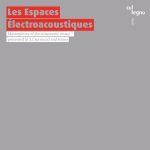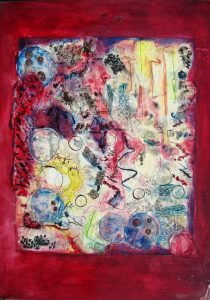 Pierre Boulez (1925-2016)
Pierre Boulez (1925-2016)
DIALOGUE DE L’OMBRE DOUBLE (1985)
For clarinet and electronics
This recording on the col legno label is the first and only version in 5.1 (you can listen to the spatialization, an integral part of the composition, at home!)
“Liebesverbrechen” (Love Crimes)
a concept concert of
Vokal und Instrumental Labors Stuttgart
Christie Finn (soprano), Philipp Lamprecht (percussion)
Felix Behringer (clarinet and conception) and Max Pross (actor and text choice)
Live recording from June 15, 2013 in Schloss Bonndorf
Video: Matthias Heuermann form-art.tv
Georges Aperghis (*1945)
SEPT CRIMES DE L’AMOUR (1979)
Music theater scenes for a singer, a clarinetist and a percussionist
Vokal und Instrumental Labor Stuttgart
with Christie Finn (soprano) and Philipp Lamprecht (percussion)
Live recording from June 15, 2013 in Schloss Bonndorf
Video: Matthias Heuermann form-art.tv
Chris Fisher-Lochhead (*1984)
TANDEM (2013)
for Bass Clarinet and Soprano
NOISE-BRIDGE
Studio recording on March 6, 2013 in the recording studio of Northwestern University, Chicago
Helmut Lachenmann (*1935)
TRIO FLUIDO (1966)
for clarinet, viola and percussion
Live recording from the final concert of the International Ensemble Modern Academy 2011/12
with Ashleigh Gordon (viola) and Philipp Lamprecht (percussion)
Watch the recording on YouTube:
Vinko Globokar (*1934)
VOIX INSTRUMENTALISÉE (1973)
for a bass clarinet player
In Voix Instrumentalisée, Globokar asks the bass clarinet player to learn a couple of new techniques how to play the instrument. The mouthpiece is removed and not used at all. Instead, the instrumentalist has to sing, speak and blow into the bass clarinet while changing the fingering and adding special effects with the voice and the keyclick sounds.
Although the words can never be clearly understood, all the spoken and sung material is based on the sentence „L’art et la science ne peuvent exister sans la possibilité d’exprimer des idées paradoxales.“ (Art and science cannot exist without the possibility of expressing paradoxical ideas). Indeed the piece expresses lots of those paradoxical ideas, not only through the expansion of the traditional bass clarinet sound, but also with how the piece is notated. In three lines, Globokar indicates the fingering, the voice and the lip pressure – sometimes very strictly, sometimes just like an improvisation concept.
The composer also demands that the bass clarinet is amplified and the bass clarinet sound should be picked up by two microphones: one on the top and one in the lower area of the bass clarinet towards the bell. In the present recording, the effect which arises through the use of the two differently placed microphones can be experienced through a stereo panning. As a result it is highly recommend to listen to the track with stereo headphones or a stereo sound system.
 New York-based violinist and artist Leah Asher created a painting to the recording. The painting is shown on the left. During the process of the creation, Leah, inspired by my specific recording of Voix Instrumentalisée, made sketches of a tremendous variety of forms on parchment paper to match the music. Afterwards, she glued the sketches in a collage-style in several layers on wood and colored them. Get inspired by the art while listening to the music!
New York-based violinist and artist Leah Asher created a painting to the recording. The painting is shown on the left. During the process of the creation, Leah, inspired by my specific recording of Voix Instrumentalisée, made sketches of a tremendous variety of forms on parchment paper to match the music. Afterwards, she glued the sketches in a collage-style in several layers on wood and colored them. Get inspired by the art while listening to the music!
Recorded on April 27, 2011 in the context of a special recording project grant awarded by the Manhattan School of Music / New York
Matt Aelmore (*1987)
FOR FELIX BEHRINGER (2011)
Unaccompanied Concerto No. 9
During my time at Manhattan School of Music, composer Matt Aelmore became a very good friend of mine. He was working on a series of special and very personal solo pieces during his studies which he called Unaccompanied Concerti. I pushed him to write one for me, too — but it wasn’t until the last month before graduation that he came up with this piece and by that time, he wanted to get rid of the expression Unaccompnied Concerto No. … The piece was premiered at my Master of Music recital in May 2011.
FOR FELIX BEHRINGER reflects Matt Aelmore’s interest in speech in connection with music. He often makes use of the freeware Google-Translate during his compositional process…
“For Felix Behringer whirl-o semantics
cognition as
walking the beach but paying too much attention to it.“~Matt Aelmore
